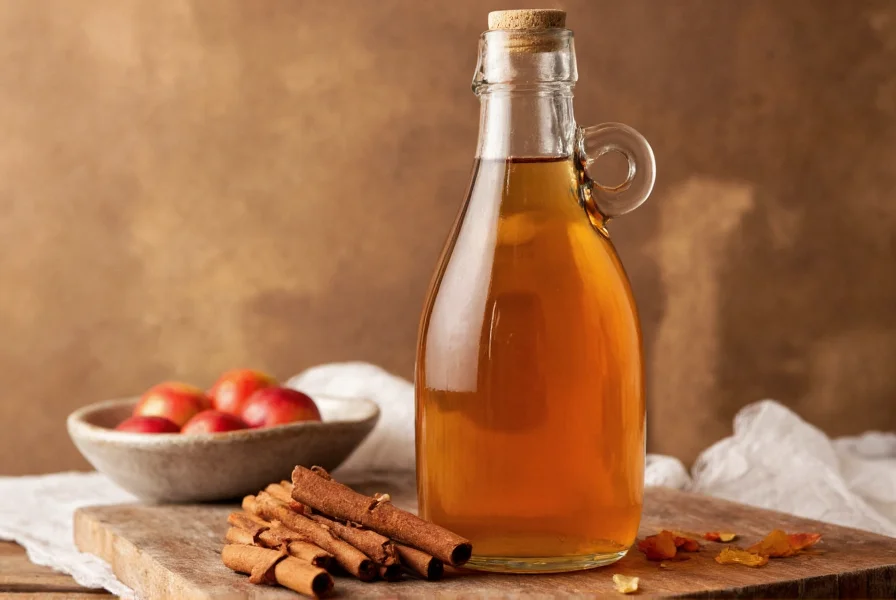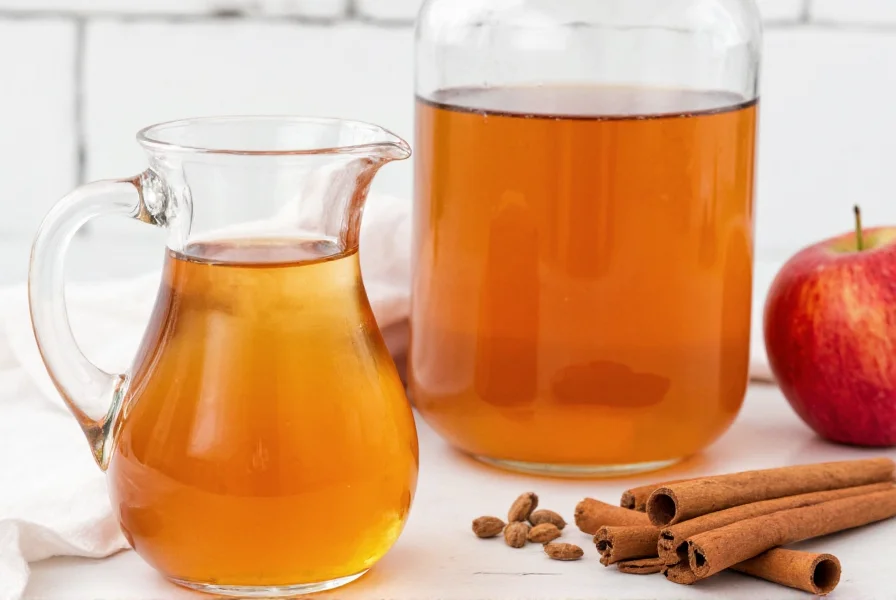Apple cider vinegar and cinnamon have gained significant popularity in natural health circles, often promoted as a powerful combination for various health benefits. This article examines what scientific research actually reveals about using these two common kitchen ingredients together, separating evidence-based findings from popular myths.
Understanding Apple Cider Vinegar and Cinnamon Individually
Before examining their combined effects, it's important to understand each ingredient's properties. Apple cider vinegar, made from fermented apple juice, contains acetic acid as its primary active component. Cinnamon, particularly the Ceylon variety, contains cinnamaldehyde and other compounds that give it distinctive properties. Both have been used traditionally for centuries, but modern science provides more nuanced insights into their actual effects.

Scientific Evidence on Individual Health Benefits
Apple Cider Vinegar Research Findings
Multiple studies suggest apple cider vinegar may help with post-meal blood sugar regulation. A 2007 study published in Diabetes Care found that vinegar ingestion improved insulin sensitivity by 19-34% in people with insulin resistance. Research also indicates potential modest effects on weight management when used as part of a calorie-controlled diet, though results are generally small (approximately 2-4 pounds over several months).
Cinnamon's Documented Effects
Cinnamon, particularly Ceylon cinnamon, shows more substantial evidence for blood sugar management. A meta-analysis in the Journal of Medicinal Food concluded that cinnamon supplementation significantly reduced fasting blood glucose levels. The compound cinnamaldehyde appears to mimic insulin and enhance glucose uptake by cells. However, effects on long-term diabetes management markers like HbA1c remain inconclusive.
What Research Says About Combining ACV and Cinnamon
Despite widespread claims about synergistic effects when combining apple cider vinegar and cinnamon, scientific literature specifically examining this combination is scarce. Most evidence remains theoretical or based on the individual properties of each ingredient. A 2019 review in Nutrients noted that while both show promise for metabolic health, no significant studies have investigated their combined effects in humans.
| Claim | Scientific Support | Notes |
|---|---|---|
| Weight loss enhancement | Limited | Minor effects observed with ACV alone; no evidence for synergy with cinnamon |
| Blood sugar regulation | Moderate (individual) | Both show individual benefits; combined effect unstudied |
| Cholesterol improvement | Preliminary | Some animal studies show promise; human evidence lacking |
| Antimicrobial properties | Established (individual) | Both have demonstrated antimicrobial effects separately |
Common Claims vs. Scientific Reality
Many online sources make exaggerated claims about apple cider vinegar and cinnamon benefits. Understanding the actual evidence helps separate fact from fiction:
Weight Loss Claims
The popular notion that apple cider vinegar and cinnamon for weight loss creates dramatic results lacks strong scientific backing. While some studies show modest weight reduction with ACV (approximately 0.5-1 pound per month), these effects are small and require consistent use alongside dietary changes. No research demonstrates enhanced weight loss from combining these ingredients.
Blood Sugar Management
Does apple cider vinegar and cinnamon lower blood sugar? Research suggests both may help with short-term blood glucose control, but effects are modest. A typical dose used in studies is 1-2 tablespoons of ACV before meals and 1-6 grams of cinnamon daily. However, these should never replace prescribed diabetes medications without medical supervision.
Safe Usage Guidelines
If you choose to incorporate apple cider vinegar and cinnamon into your routine, proper usage is essential for safety and effectiveness:
Recommended Preparation
An apple cider vinegar cinnamon drink recipe commonly used in studies involves:
- 1-2 tablespoons of raw, unfiltered ACV
- 1/2 to 1 teaspoon of Ceylon cinnamon
- 8 ounces of water
Mix well and consume before meals. Always dilute ACV to protect tooth enamel and throat tissue.
Dosage Considerations
Excessive consumption of either ingredient can cause problems. More than 2 tablespoons of ACV daily may lead to tooth enamel erosion or digestive issues. Cinnamon consumption above 1-2 teaspoons daily of Cassia cinnamon (the common variety) may expose you to concerning levels of coumarin, a compound potentially harmful to the liver. Ceylon cinnamon contains significantly less coumarin.

Potential Side Effects and Interactions
Understanding the side effects of apple cider vinegar and cinnamon is crucial for safe use:
- Medication interactions: Both can enhance the effects of diabetes medications, potentially causing hypoglycemia
- Dental concerns: Undiluted ACV can erode tooth enamel over time
- Digestive issues: Some people experience nausea or indigestion
- Allergic reactions: Though rare, possible with either ingredient
- Pregnancy considerations: Consult your healthcare provider before regular use
When to Consult a Healthcare Provider
Before incorporating apple cider vinegar and cinnamon into your health regimen, especially for therapeutic purposes, consult with a healthcare provider if you:
- Take medications for diabetes, heart conditions, or potassium levels
- Have kidney problems
- Are pregnant or breastfeeding
- Have a history of digestive disorders
- Experience persistent side effects
Conclusion: Evidence-Based Perspective
While apple cider vinegar and cinnamon show promise for certain health applications, particularly blood sugar management, the scientific evidence supporting their combined use remains limited. Both ingredients are safe when used in culinary amounts, but therapeutic doses require careful consideration of potential side effects and interactions. Neither should be viewed as miracle cures, but rather as potential complementary elements to an overall healthy lifestyle. Always prioritize evidence-based approaches and consult healthcare professionals for medical concerns rather than relying solely on natural remedies.
Frequently Asked Questions
What is the best time to drink apple cider vinegar and cinnamon water?
Research suggests consuming diluted apple cider vinegar with cinnamon about 20-30 minutes before meals may help with blood sugar regulation. Many studies examining ACV's effects on blood sugar had participants consume it before their largest meal of the day. However, if you experience digestive discomfort, try consuming it with food instead.
How long does it take to see results from apple cider vinegar and cinnamon?
Any potential benefits from apple cider vinegar and cinnamon typically require consistent use over several weeks to months. Blood sugar effects may be noticeable within weeks, while more subtle benefits might take 1-3 months of regular use. However, significant health changes shouldn't be expected, as research shows only modest effects from these ingredients.
Can apple cider vinegar and cinnamon help with PCOS symptoms?
Some preliminary research suggests apple cider vinegar may improve insulin sensitivity in women with PCOS, which could help manage symptoms. A small 2013 study found ACV improved insulin sensitivity in women with PCOS. Cinnamon has also shown potential benefits for PCOS-related insulin resistance. However, larger studies are needed, and these should complement—not replace—standard medical treatments for PCOS.
Is it safe to take apple cider vinegar and cinnamon every day?
When used in culinary amounts (1-2 tablespoons ACV and 1/2-1 teaspoon cinnamon daily), both ingredients are generally safe for most people. However, long-term daily therapeutic use requires caution. Excessive ACV can lead to tooth enamel erosion and potential drug interactions. High doses of Cassia cinnamon may expose you to concerning levels of coumarin. Consult your healthcare provider before daily therapeutic use.
What type of cinnamon should I use with apple cider vinegar?
Ceylon cinnamon is generally preferred over Cassia cinnamon when using therapeutic doses. Ceylon contains significantly less coumarin, a compound that can be harmful to the liver in large amounts. While Cassia is more common and less expensive, Ceylon is considered safer for regular consumption. Look for "Ceylon cinnamon" or "true cinnamon" on the label.











 浙公网安备
33010002000092号
浙公网安备
33010002000092号 浙B2-20120091-4
浙B2-20120091-4